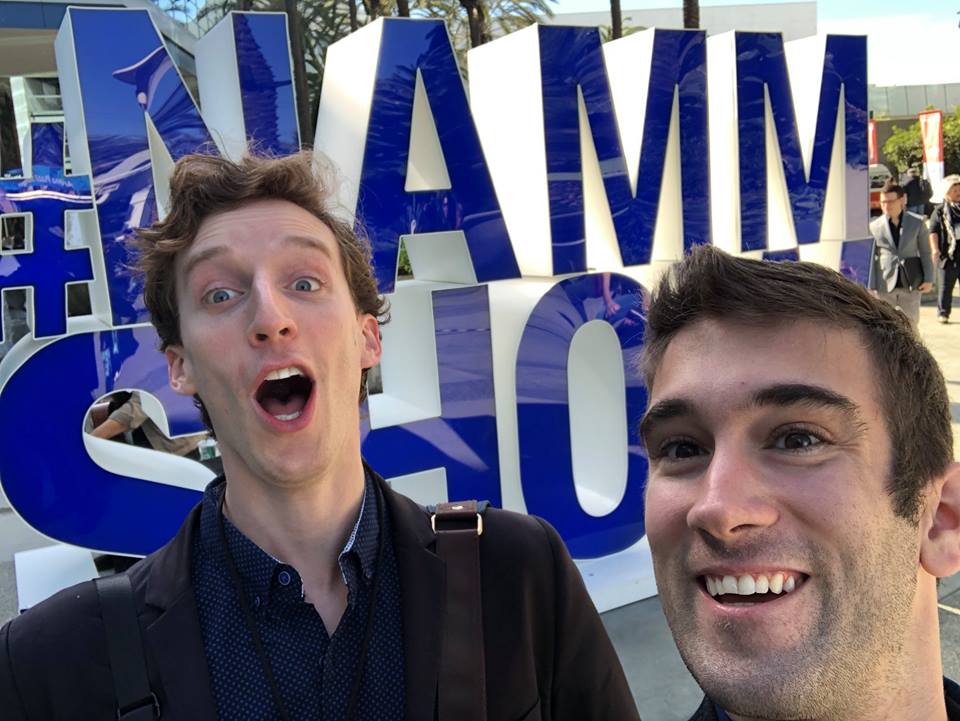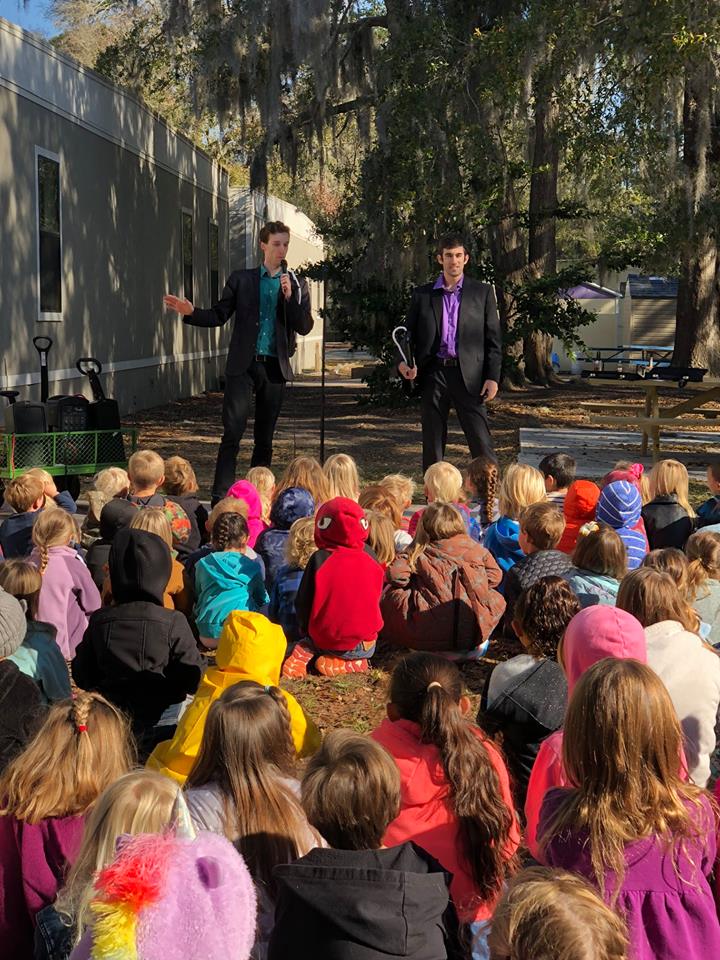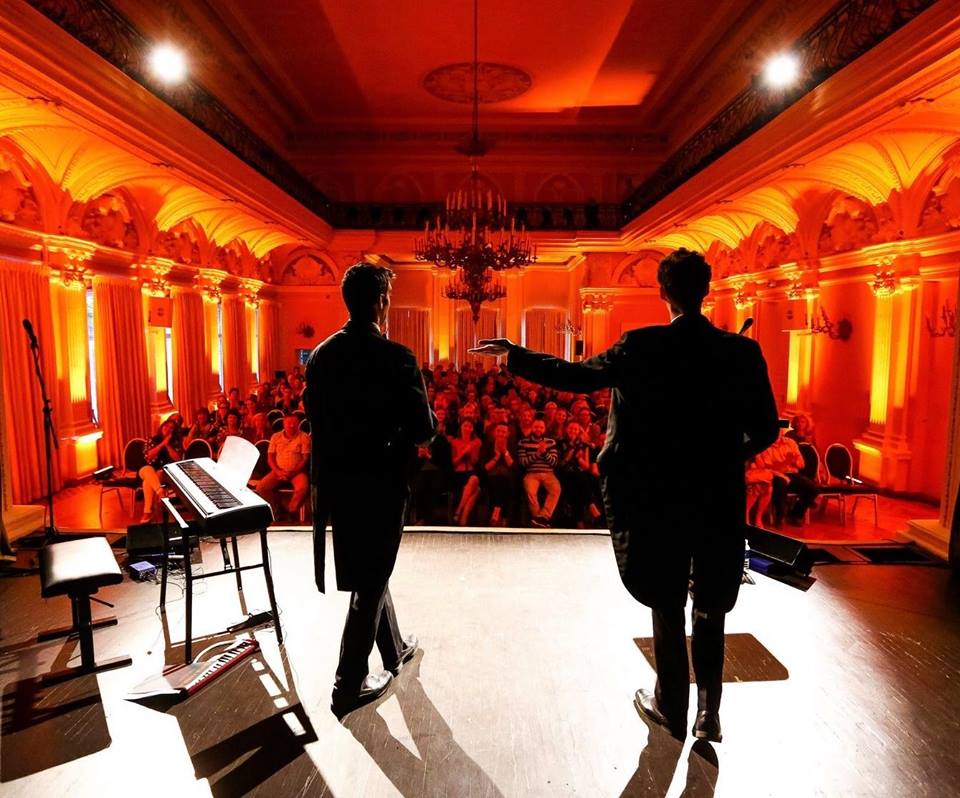In elementary school, teachers introduce kids to music through melodicas—small, toy-like instruments that spark sheer joy. For Tristan Clarke and Joe Buono, their introduction to the melodica, an entry-level learning instrument, was far from basic and way more advanced than elementary school lessons. What started as a fascination and admiration for the instrument quickly transformed into the viral sensation, the Melodica Men. The musical duo has garnered over 100 million views on their YouTube channel, featuring covers of your favorite songs and orchestral pieces like “Africa” and “The Rite of Spring.” In our Q&A with Clarke, we uncover the past, present and future of the melodica movement.
Experience Melodica Men perform live at The 2020 NAMM Show! Register here today!
College Magazine: We’re excited to hear about your upcoming performance at an Anaheim Elementary School for the NAMM Foundation’s annual Day of Service and The 2020 NAMM Show’s GenNext Plenary; what are you most looking forward to in participating?

Tristan Clarke: We’ve played a lot of times in front of children before and it’s actually a very humbling experience. Children are a very honest audience because if they don’t care, they don’t act like they care, they don’t pretend like they do. It keeps you on your toes and shows you what about your show is good and what maybe isn’t. Also, of course, the fact that the melodica has so much potential as an educational instrument. It’s used in Japan and Korea as the recorder equivalent basically. So that’s a goal, a long-term goal, to get children excited about it. It’s not hard to get them excited about it, it’s sometimes hard to keep their attention but that lies on us as performers and then we make our performance even better because if we can keep their attention then we can keep the attention of adults.
CM: Why do you believe music education is important? How do you hope to impact music education?

TC: My own experience with music has been so profound. You know, my whole life has been committed to playing music and sharing music. Even if I wasn’t a professional musician who makes my income from that, I would still have so many valuable life skills and experiences that I wouldn’t trade for anything. I think it’s just a language that needs to be continued because it’s so extraordinary, so powerful and special. It feels like a language… that needs to be actively continued because if it’s not then it will be lost and that would be a crime. Even if you’re not going to be a musician, but you’re practicing music…there are many lessons you can learn about life in general like teamwork and collaboration. Lots of people in non-musical fields, when they talk about working together as a team, they use sort of a cliché, “Oh, like an orchestra” but it’s completely true! If one person isn’t on board, the whole thing is derailed. When you learn that, you learn accountability in an obvious way because if you don’t learn your part, you stick out like a sore thumb.
CM: By performing classical pieces like The Rite of Spring on your YouTube channel, is that your way of sharing and keeping that kind of music alive?
TC: Yeah, that was the beginning for us. We found our niche market and classical music is a niche as opposed to “Africa” by Toto or video games like Mario because everybody knows those, but classical music is our niche. We grew from there. Dumbing it down for two instruments and two people in costumes, it makes it very accessible and shows people very easily and directly what’s so great about it. It might be just the thing a child needs, then they’ll watch our videos and hunt down the actual music and will be listening to Pines of Rome and Scheherazade. They’ll be listening to these real orchestra masterworks—the things that I love—and they’ll actually care about it whereas they may not have initially or found on their own had it not been for our entry point.
CM: What has been your favorite or most memorable performance so far?

TC: There are some that stick out to me for being funny. For example, this summer we went to Anaheim—again—to this thing called VidCon. It was sort of a glimpse into this other world like L.A. show business type stuff and you know, we are not that. We’re just like a couple [of] clowns; I play in an orchestra, Joe teaches music and obviously we are in show business in a sense but not like Hollywood type stuff. So, we go to Anaheim and VidCon was such a huge production—not anything close to The NAMM Show which is even more massive. It was this huge ordeal; we had all these rehearsals and literally went on stage and played for 10 seconds— that was it. They flew us out there, it was a giant ordeal and it was gone in a second, or 10, but it was fun, very fun. Also, we played once in Lithuania at the Accordion Music Festival. I think that sticks out just as being hilariously random. Do you know where Lithuania is on a map? Because I do now.
CM: After Studying at Julliard and the Peabody Conservatory, what inspired you to transition from a formal musical environment to pursue playing toy instruments on the streets of Paris?
TC: I got the job with the Jacksonville Symphony in May but it didn’t start until mid-September so I had months off. Joe actually brought the melodica to me when he visited me in Charlotte. I had never seen it, never heard it, and didn’t know what it was. I could sort of play the piano, obviously, I have learned instrument skills because I play the trumpet, so Joe brings this instrument to me and I play it for two seconds and I’m just like this is the greatest thing I’ve ever played. So, I had this big chunk of time off and I was going to Seattle to be with my aunt and uncle and dog sit for a couple of weeks, so Joe came with me. We brought our melodicas and were learning random songs all by ear and memory and we were on the back deck one day, hanging out with the dog who was supposed to be our responsibility, playing some songs and we decided why not go into the town—which, where my aunt lives, has a tiny downtown area. That was our first time ever playing in front of people. Then, my dad lived in Paris at the time and I was going to visit him, and with the money we made busking we went to Paris. It was completely spontaneous.
CM: What are your goals in the next five years with regards to your melodica career?

TC: It’s absolutely something I want to keep doing and I want to do it as much as possible but I don’t ever want to quit my main job playing trumpet because I’ll always keep that even if I’m going to make a billion dollars playing melodica. I can’t give up playing the trumpet and I don’t want to, so I won’t. But I’d love—and we’re already getting a lot of traction with big-name groups—to put on orchestra shows, like pop concerts or something like that where we headline the concert because that just sounds like a lot of fun. We have a lot of ideas that are really good for putting together a product like that. We’re doing a lot of stuff with orchestra and we have been for a couple of years, but usually, we only play 15 minutes and are out there for less than 20 minutes. We’re a part of the whole two-hour show, but I want us to be the show with an orchestra. We have our first one lined up in February and I’m hoping we can promote that and do a lot of stuff with that, share it with the right people to get more nibbles and orchestra shows through that. And of course, keeping up with our videos and growing our online presence.
CM: Is there any advice you wish you were given during your musical pursuits (or advice you were given that was helpful) that you would like to share with music students today?
TC: One of the biggest challenges we came across was after we first went viral, we suddenly had tons of momentum and the whole classical music world was talking about it. I could speak with anybody, people in the Philharmonic, people in the Berlin Philharmonic, they’re like, “Oh yeah, I know who you are, I’ve seen this video, I’ve seen that.” They knew who we were. The hard part for us was trying to figure out what do we do now. What’s next? That’s always kind of the challenge. And when you’re doing something like this, we are our own bosses. While some people may think that’s super liberating, it’s actually hard because now you’re the one who has to administer tasks and choose which direction you’re going to go. There are so many different ways we could’ve gone in terms of what we could’ve made our videos look like and what we wanted to be. We had to decide where we wanted to go and instead of having our brains spread so thin, we had to focus on how to spend our time. I don’t think there’s really any advice as to how you can do it better, you just have to really think about it.
CM: You are most known for your whimsical, 100% fun, and upbeat musical videos; what else do you want your fans and the music world to know about you?
TC: We get a lot of satisfaction and joy from playing live concerts and not everyone online knows that we do live performances even though we do them a lot. We’ve put some promo videos out of some of our live concerts and stuff like that, so we’ve shown people on Facebook but not everyone’s seen that. They see them here and there but they’re not following us religiously or anything, but I would like people to know that because I’d like to do that more. It’s just so fun and everyone likes it, everyone has a good time and we get to go to interesting places and meet nice people who care about music. We’ve gotten to do a lot of really cool things and experience really cool things in life. If everyone knew that this was something we did, I think we’d get even more cool things lined up. Like, I didn’t even know what The NAMM Show was until someone asked us to go there. I’ve been to The NAMM Show once already and it was super cool, and I never would’ve known if someone hadn’t asked.
Join the melodica fun with Melodica Men at The GenNext Plenary at The 2020 NAMM Show on Thursday, Jan 16 at 9:30 a.m. College music students and faculty are invited to register here.
This post is sponsored by The NAMM Foundation.



















